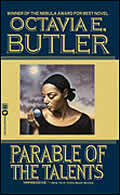
| Series: | Earthseed #2 |
| Publisher: | Warner Aspect |
| Copyright: | 1998 |
| Printing: | November 2001 |
| ISBN: | 0-446-61038-0 |
| Format: | Mass market |
| Pages: | 448 |
This is a direct sequel to Parable of the Sower, and while reading the previous book first isn't strictly necessary (Butler does a great job at setting up the world again without doing mindless recaps), I recommend it as it adds a fair bit of depth. Plus, it's an excellent book.
Parable of the Sower was told completely from the viewpoint character's journals, which I liked. They didn't always feel like journals (it's hard to maintain that feeling despite detailed retellings of dialogue), but Butler did a better job with consistency than most and the framing helped the story without getting in the way. I was rather disappointed, then, when Butler changed the formula and instead mixed Lauren's journals with commentary from her daughter and occasional bits and pieces from other people's journals as well. By the end of the book, it had grown on me and I appreciated the complexity of characterization and perspective Butler was aiming for, but it was distracting at first and felt disjointed. The narrative voice of Lauren's daughter never completely gelled either; at times, the book felt like a scrapbook she was putting together, and at times it felt like a third person was piecing together her comments with the other writing.
Structurally, the perspective of Lauren's daughter from farther into the future provides advance warning and prepares the reader for some of the nasty things that happen, and Parable of the Talents is a much nastier book than Parable of the Sower. Religious, and specifically Christian, fantaticism has reared its ugly head, and the chaos of the previous book shifts slowly into a more sinister totalitarianism. This, like the post-apocalyptic scenario of the previous book, probably sounds familiar. Butler again approaches the topic from a far more realistic and deep direction than the average SF dystopia, with political twists that feel mostly believable and a few notes that presage the "war against terrorism" from several years after it was written, but this time it's not quite as original as Sower was. One of the things I liked best about Sower was the lack of on-screen villains; Parable of the Talents introduces some in a quite dramatic fashion.
This is not the book to read if you want an escape from infuriating US politics. It's an excellent book for pointing out the sorts of things that organized Christianity seems capable of given a sufficient crisis to make people afraid and reactionary, the reasons why religious certainty is so frightening, and the terrifying ways humans can abuse those they don't consider important while claiming to be helping them. It's evocative, bitter, and not particularly subtle, so anyone who would take the above as a personal attack on their religion may want to steer clear of this book. But while it loses some in subtlety compared to Sower, it packs an effective emotional punch and retains Butler's adept characterization and avoidance of easy answers.
Parable of the Talents is partly about the world background and how the characters struggle to survive and partly about how a new religion can form. Earthseed becomes more than Lauren's personal dream and starts developing as a community and a religion, which at times works quite well and at times feels a bit too easy. Particularly towards the end of the book, Lauren (now going by Olamina) converts people with a suspicious ease (although admittedly one thing that most religions have in common is a charismatic and persuasive founder). I did like, though, how Earthseed found its own traditions, how the religion of a small group contrasted with the religion of a growing population, and how Olamina struggled to find the best ways of spreading it. I'm not sure I completely bought the outcome, but I liked seeing the in-depth exploration of the idea.
The third major theme of the book is Olamina's interactions with her family, both in her own time and over the gap of years with her daughter. Her daughter as revealed in her commentary and brief stories about her own life is a frustrating and intriguing character, not entirely sympathetic, and often not on Olamina's side. Butler does a good job having two first-person viewpoint characters in the book who often disagree. It helps that they don't interact directly for nearly all of the book, and as disjointed as it felt at first, I eventually came to like the interplay of journal entries and hindsight commentary from the future. The ending is rough, emotional, and realistically tangled, true to all of the complex characters built up through the book. I came away feeling like I understood the perspective of each of the characters and couldn't side entirely with any of them.
This isn't quite the book that Parable of the Sower was. It's a bit more blatant, a bit more black and white, a bit less pure and focused. It takes on larger issues and a larger stage, and as a result moves away from the clarity of the previous book. Still, though, it's engrossing and thoughtful from start to finish, brutally honest in its take on an economic and social collapse (no happy band of invincibly lovable libertarians here), and often intense. Despite thoroughly hateable villains and a main character with a bit of a charmed existence, Butler's sociology is excellent, a cut above even the top shelf of science fiction. Recommended, but not as much as Parable of the Sower.
Reviewed: 2006-04-05